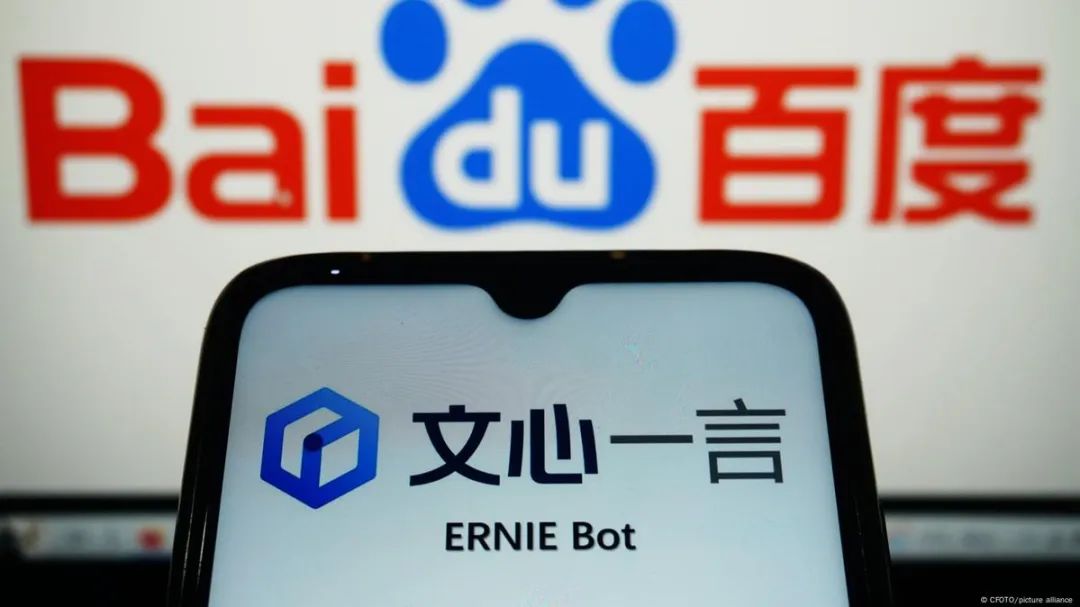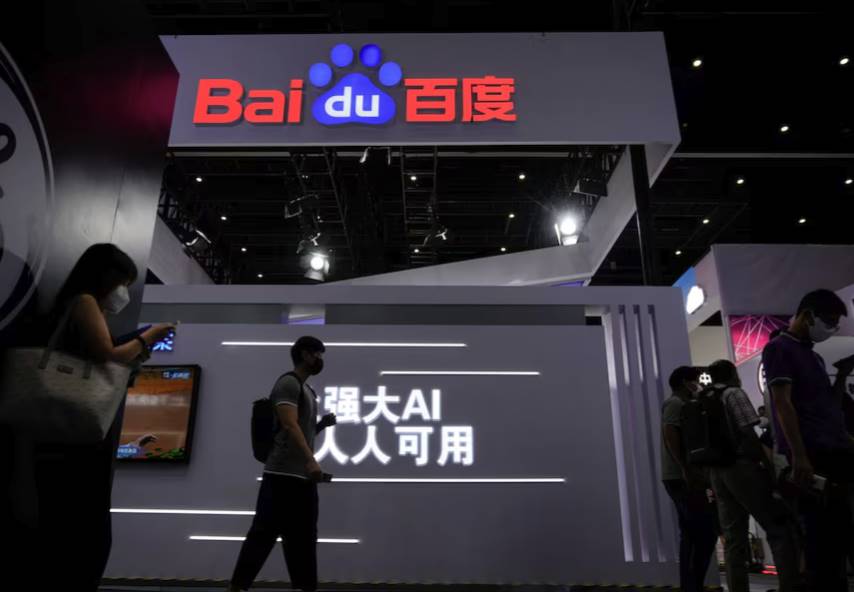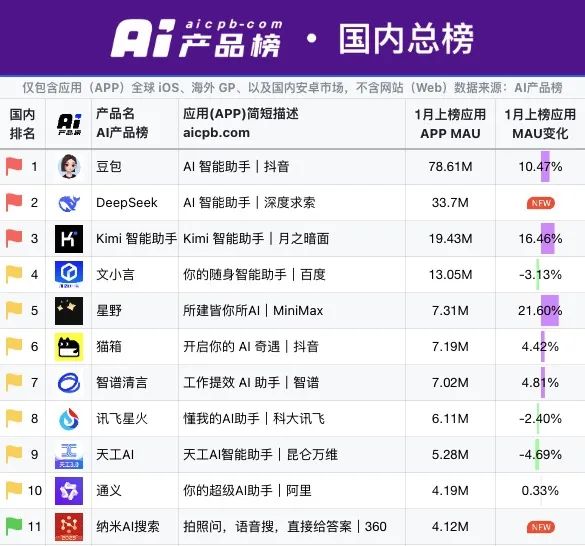Ten years later, Baidu is facing the same problem again.
Author: Xu Qiaomei, Industry Technology

Image source: Generated by Wujie AI
Baidu, which is all in on AI, is being besieged by AI.
In 2025, with the explosive popularity of DeepSeek and the integration of various platforms and enterprises, the landscape of the artificial intelligence market has undergone drastic changes. Open-source free AI models pose new challenges to the business models of closed AI models. Who can take the lead in the new round of AI competition has become a focal point in the market.
In recent years, many players have gathered in the domestic AI sector, from tech giants like Alibaba, Tencent, and ByteDance to a large number of AI startups like the "AI Six Dragons" and the wildly popular DeepSeek. For Baidu, this represents yet another significant challenge following its strategic transformation in AI.

Baidu is one of the earliest companies in China to propose a comprehensive layout of AI technology. The first batch of AI talent that left Baidu formed a distinct force in China's AI startup wave, leading Baidu to be referred to as the "Huangpu Military Academy of AI." However, whether it will repeat the mistake of "arriving late" is crucial, as every subsequent move is critical.
Missing the AI "Golden Accumulation Period"
A few days ago, Baidu released its financial report for the fourth quarter and the entire year of 2024. The data shows that Baidu's total revenue for 2024 reached 133.1 billion yuan, a year-on-year decline of 1%, with a net profit of 23.4 billion yuan, a year-on-year increase of 21%.
As one of its core businesses, Baidu's online marketing revenue for the fourth quarter of 2024 was 17.9 billion yuan, a year-on-year decrease of 7%. In December 2024, the monthly active user count of the Baidu app reached 679 million, a 2% increase compared to the same period last year, but a 3.55% decrease compared to the previous quarter's 704 million.
Faced with this mixed financial report, Li Yanhong pointed out in the earnings call: "The AI cloud business is showing strong momentum, with revenue growing by 26% year-on-year, offsetting the weakness in our online marketing business. The growth is mainly due to the market's broad recognition of our AI capabilities, and we will continue to invest in AI to ensure we remain at the forefront of this technological trend."
However, standing at the forefront of the AI technology trend is not easy. If Baidu can achieve results comparable to OpenAI's ChatGPT or Google's DeepMind in the AI field, it would mark a significant turnaround. But currently, since Baidu proposed "ALL in AI" in 2017, the golden market accumulation period for AI technology has passed. Without outpacing its AI peers, Baidu's path to rejoining the ranks of super giants through AI has become increasingly difficult.

Among the internet tech giants, "BAT" used to be an equal presence, but now, few people talk about BAT anymore, as Baidu's revenue level is no longer on par with Alibaba and Tencent.
Alibaba's revenue for the fourth quarter of 2024 was 280.154 billion yuan, an 8% year-on-year increase, with just the Taotian Group's revenue portion reaching 136.091 billion yuan. Tencent's revenue for the third quarter of 2024 was 167.193 billion yuan, also an 8% year-on-year increase. The quarterly revenue scale of these two giants has exceeded Baidu's total annual revenue.
In this year's earnings call, Alibaba Group CEO Wu Yongming mentioned that in the next three years, Alibaba's investment in cloud and AI infrastructure will exceed the total of the past ten years. Tencent has also recently made significant moves in the AI field through social software like WeChat, leveraging its large user base. Both giants have ample "resources" to support their competition in AI.
Is there an opportunity for AI technology to bring Baidu back to the ranks of giants? It should be possible, but the premise is whether Baidu can achieve a level far exceeding its Chinese peers and even reach a world-leading standard in the AI sector.
Taking OpenAI as an example, the company has been laying the groundwork for general artificial intelligence (AGI) since its establishment in 2015. Initially, it did not have particularly outstanding products, but after continuous deepening of AI technology, it quickly gained popularity with the launch of ChatGPT in 2022, sparking in-depth discussions and reflections on artificial intelligence worldwide. It remains a leader among top AI large models, achieving another breakthrough in AI technology following Google's DeepMind's AlphaGo series.

In 2025, if SoftBank Group completes a $40 billion investment in OpenAI, the company's post-investment valuation will reach $300 billion. What does this mean? Alibaba's market value in the US is about $340 billion, while Tencent's market value is around $514 billion. Hypothetically, if Baidu had launched a "ChatGPT"-level AI application in China after its "ALL in AI" transformation and could maintain a technological lead, a valuation of $300 billion+ compared to Baidu's current market value of about $32 billion in the US would make it possible to sit at the same table as Alibaba and Tencent. Unfortunately, there are no "what ifs."
Baidu began researching and applying deep learning in early 2012, and between 2013 and 2015, it established several institutions, including the Baidu Deep Learning Research Institute (IDL), the Big Data Laboratory (BDL), and the Silicon Valley Artificial Intelligence Laboratory (SVAIL), which once gathered many world-class experts in the AI field. Even though it announced its "ALL in AI" transformation in 2017, from a timeline perspective, it is not too late. The key lies in how to lay out AI technology during this golden accumulation period, what kind of AI technology to pursue, whether to aim for world-class technology levels or rush into AI commercialization. Different choices directly affect the outcome of the story.
DeepSeek's ability to impact global tech giants in the AI field serves as a good model, achieving results that benchmark against OpenAI's flagship model. However, OpenAI also has upcoming releases like GPT-4.5 and GPT-5. Who will benchmark against them is a collective test for Chinese AI companies, and whether Baidu can take the top spot remains uncertain.
In the long run, whether Baidu can become a representative of top AI technology in China is key to winning the AI turnaround battle. However, there is no time or opportunity left to accumulate strength. In the fiercely competitive AI market, the difficulty of breaking through has increased several times compared to ten years ago.
Forced Transformation to "Open Source and Free"
When transitioning from the PC era to the mobile internet era, Baidu missed an opportunity to take off due to falling behind in competition. Recently, changes in the AI market and the fierce "AI entry" competition have made Baidu somewhat passive. Despite years of deepening AI technology, it seems to have missed the pulse of AI market development.
Recently, Tencent leveraging the popularity of DeepSeek to make strides in the AI market is a significant development. The integration of DeepSeek-R1 into the "national application" WeChat has brought unprecedented market attention. Tencent has also launched an assault on the "AI search" market, leveraging its vast user base. Data shows that the combined monthly active accounts of WeChat and WeChat reached 1.382 billion, making the cultivation of AI search habits among these users a huge commercial potential.
Following this, Tencent's Yuanbao AI model, ima, QQ Browser, Tencent AI Code Assistant, Tencent Cloud Smart Computing, and a series of products have all completed integration with DeepSeek, allowing them to catch up in the market.

Alibaba, on the other hand, has become a subject of market reassessment by riding the coattails of "Apple AI." According to research firm QuestMobile and related reports, Apple has about 250 million users in China. With Apple's AI landing in China, Baidu, which has been deeply engaged in AI technology for many years, should have been the primary partner, but Apple ultimately prioritized Alibaba.
Canalys data shows that in the third quarter of 2024, Alibaba Cloud held a 36% share of the cloud market in mainland China, ranking first in the market. Additionally, after DeepSeek became popular in the global open-source community, Alibaba's Tongyi Qianwen Qwen series models have also gained significant attention, with the global download volume of the Qwen series models reaching 180 million and a total of 90,000 derivative models, surpassing Meta's Llama to become the world's largest open-source model series. Whether for considerations of cloud computing or AI technology influence, this provided Apple with ample reasons for prioritization.
The new giant ByteDance established a long-term AGI research team called "Seed Edge" in January 2025. According to public data, in December 2024, its AI application Doubao App's monthly active user count strongly surpassed 75 million, making it a formidable competitor that Baidu's "New Search" tool Wenxiao Yan App cannot ignore. Moreover, according to QuestMobile data, ByteDance's Douyin had a user count of 1.108 billion in 2025 after deduplication, becoming the most powerful channel and engine for promoting AI applications.
Faced with the wave of DeepSeek and the AI competition from Alibaba, Tencent, and ByteDance, Baidu's "leveraging" appears somewhat weak.

During the 2024 World Artificial Intelligence Conference, Li Yanhong stated in a public speech that everyone should stop competing in AI models and focus on applications, mentioning that without applications, having only foundational models, whether open-source or closed-source, is worthless.
However, to keep pace with market changes, Baidu, which had been focused on closed AI models, recently announced a series of operations regarding the integration of DeepSeek. For example, Baidu Search will fully integrate DeepSeek and the Wenxin large model's deep search functions, the Wenxin large model will be announced as fully free starting April 1, and the Wenxin large model 4.5 series will be launched and open-sourced in the coming months. However, relying solely on such adjustments does not provide a significant advantage in today's competitive AI market. How to build a new business model after going open-source is also a major challenge, and Baidu is increasingly running out of options to lead the market development situation.

Whether the open-sourcing of the Wenxin large model 4.5 series can create a sensational effect in the industry may be key to the success or failure of Baidu's next move. However, open-source and free do not mean relaxing the technical standards. Whether Baidu can surpass the open-source influence of DeepSeek and Alibaba's Qwen in AI technology innovation, and whether it can suppress the rise of strong applications like Doubao in free applications, presents numerous challenges.
Baidu Still Needs to "Seek Solutions" Internally
Some market changes also stem from the segmented track of AI technology in autonomous driving.
As 2025 begins, two companies once hailed as autonomous driving unicorns, Zongmu Technology and TuSimple, have been reported to be facing uncertain futures. Zongmu Technology is in a survival crisis due to issues like cash flow depletion and failed IPO attempts; TuSimple has experienced fluctuations due to management disputes and difficulties in transformation, announcing the dissolution of some teams.
The already publicly listed companies, WeRide and Pony.ai, have recently seen an increase in their market values. As of February 21, 2025, WeRide (WRD) had a total market value of $6.703 billion, while Pony.ai (PONY) had a total market value of $9.172 billion.
However, the "insufficient blood generation capacity" remains a dilemma that the autonomous driving sector has yet to overcome. Financial reports indicate that WeRide's total revenue for the first three quarters of 2024 was 220 million yuan, a year-on-year decrease of 14.3%, with a net loss reaching 1.924 billion yuan, and an adjusted net loss of 556 million yuan; Pony.ai reported revenue of $24.72 million in the first half of 2024, with a net loss of $51.78 million.

Aside from the Wenxin large model, Baidu's key layout in the autonomous driving field, "LuoBo KuaiPao," is also unlikely to become a strong business growth point in the short term. The market changes are not optimistic; with companies like Huawei and Didi Chuxing rapidly entering the autonomous driving field, almost all car manufacturers are accelerating the development of smart cockpits and self-developed autonomous driving technologies, creating a highly competitive landscape. LuoBo KuaiPao faces immense pressure to break through.
It can be said that in the AI field, if one cannot be the strongest in the industry and falls into the second or even third tier, the competitive environment becomes even more crowded.
According to the "Global Digital Economy White Paper (2024)," as of July 2024, there are 1,328 large AI models globally, with China's share accounting for 36%. Based on this ratio, the number of AI large models in China is approximately 478, involving numerous vendors across various fields.
From the current trend, the AI industry is destined to be a flourishing landscape. How high Baidu, which is all in on AI, can soar while standing at the forefront of AI is not a new problem arising from market environment changes, but rather an old problem that Baidu urgently needs to solve internally:
What exactly has been missing in the transition from the PC era to the mobile internet era, and then from the mobile internet era to the AI era?
免责声明:本文章仅代表作者个人观点,不代表本平台的立场和观点。本文章仅供信息分享,不构成对任何人的任何投资建议。用户与作者之间的任何争议,与本平台无关。如网页中刊载的文章或图片涉及侵权,请提供相关的权利证明和身份证明发送邮件到support@aicoin.com,本平台相关工作人员将会进行核查。




